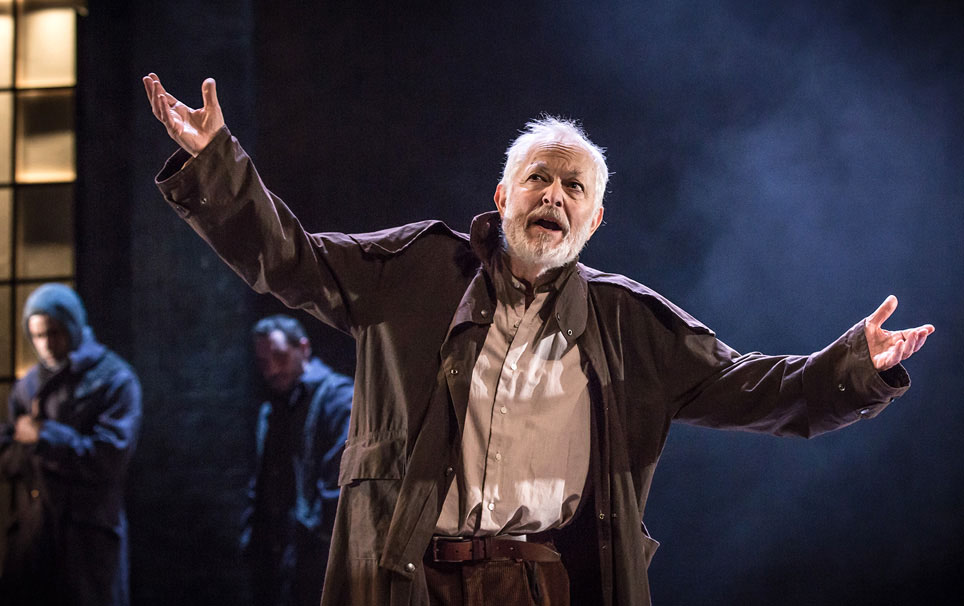
Michael Pennington has been around for as long as many of us can recall being interested in the theatre and the eventual coming to Lear seemed a good fit. Whilst not lacking in regal authority, his Lear is, naytheless, more a seeming politician used to getting his own way and thus tipped into senility by an uncontrollable temper no longer packing the authority to frame events. This is as least as plausible as realizing one’s daughters have taken the role of parent before one is prepared to be the child. The always problematic scene of the aged Lear disinheriting his favourite daughter is thus given an easy plausibility.
Here is no actor playing an old man; the pathos was real, the gear changes as unconscious and smooth as an automatic clutch, the slide from reason is measured and with naturalistic glimpses of sanity breaking through the crumbling façade intermittently. The refusal to see what is before his eyes, gains, not our sympathy, but an amused recognition, bringing the status of the exalted to the level of everyman.
That other perennial bone of contention – is the sound and fury of the storm in the language, obviating the need for further effects? – is here unresolved. Mr Pennington undoubtedly has the vocal equipment to best the sound effects yet we can quibble over the degree to which it is an acceptable struggle for the audience to pick out the voice from the manufactured sounds of nature in turmoil. Given the scene is about Lear’s internal state of mind I see no reason why the initial scene-setting blast should not recede into the background leaving the actor to do the work.
Another quibble (in a generally solid production) is that the mid-twentieth century setting might have suggested some fore-grounding of the imminent dangers of invasion, yet when Cornwall, one of Shakespeare’s nastier martial figures, receives news that the French had landed, the intelligence went for nothing and he barely blinked, seemingly unconcerned at the imminent threat.
Cuts are inevitable even in a show that is just shy of three hours (including interval). Inexplicably cut however is Edmund’s, ‘the lusty stealth of nature’ passage from the, ‘Thou nature art my goddess..’ speech, when sex was clearly on the mind of the director where he has Regan preparing to perform oral sex on Oswald (Daniel O’Keefe – and here a kind of shadowy butler without portfolio) by way of getting him to spill the beans, as it were, on Goneril’s letter to Edmund. The (near) act came as a shock having been plonked, fully formed as a character trait, into Act IV Scene 5 with ne’re a by-your-leave. It’s an interesting ploy that might have been more clearly woven into the interpretation. The more obviously sensual Goneril is given a good crack of the whip by Catherine Bailey.
Edmund (Scott Karim) could be something unpleasant in financial services and takes an almost reason-driven approach to his machinations. His odd vocal dance I found more quirky than informative. Gavin Fowler (Edgar) throws himself with gusto into Poor Tom and hinted at a nobility worthy of his father once having returned to his rightful self. Cordelia (Beth Cooke) in the first half, prior to leaving for France, is a delicate presence that nevertheless echoes her father’s obstinacy and shows enough backbone to suggest her return will be to Britain’s good.
This is a thoroughly creditable production with a central performance that shines as a collector’s piece with a unique take on the role. ★★★★☆ Graham Wyles 7th June 2016
Photo by Marc Brenner

